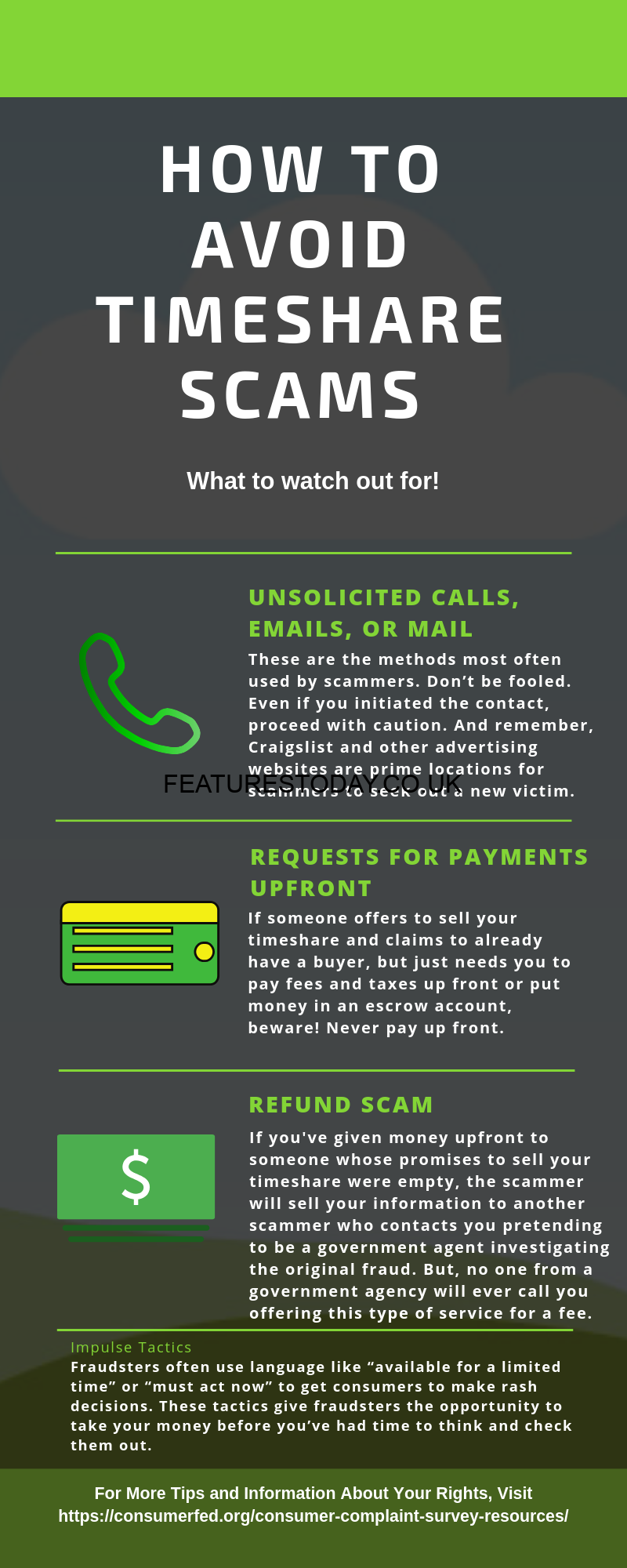Time Share Scam What You Need to Know Before You Buy or Sell
Time shares are a popular way of owning a vacation property without paying the full price. You buy a share of a resort unit and get to use it for a certain period each year. Sounds like a great deal, right? Well, not always. Time shares can also be a source of frustration, regret, and financial loss for many owners. In this blog post, I’ll explain what time share scams are, how to avoid them, and what to do if you want to get out of your time share contract.

What are time share scams?
Time share scams are fraudulent or deceptive practices that target time share owners or potential buyers. They can take many forms, but some of the most common ones are:
- High-pressure sales tactics. Some time share developers or salespeople use aggressive or misleading techniques to persuade you to buy a time share. They may offer you free gifts, discounts, or incentives to attend a sales presentation, where they will pressure you to sign a contract on the spot. They may also make false or exaggerated claims about the property, its value, its availability, or its benefits. They may not disclose all the fees, taxes, maintenance costs, or restrictions that come with owning a time share. They may even try to prevent you from reading the contract or consulting a lawyer before signing it.
- Resale scams. Some time share exit companies or brokers claim they can help you sell your unwanted time share for a fee. They may contact you unsolicited by phone, mail, email, or text, and say they have a buyer ready to pay a high price for your time share. They may ask you to pay an upfront fee, a closing cost, a transfer fee, or a commission to secure the deal. However, once you pay, they may disappear with your money, or fail to deliver on their promises. The buyer may not exist, or may not be willing to pay the price they quoted. You may end up losing money and still owning your time share.
- Exit scams. Some time share exit companies or lawyers claim they can help you cancel your time share contract for a fee. They may promise to negotiate with your time share company, file a lawsuit, or use a legal loophole to get you out of your obligation. They may ask you to pay a large upfront fee, or a monthly fee until the process is complete. They may also tell you to stop paying your time share fees or mortgage, which can damage your credit score and lead to foreclosure. However, once you pay, they may do little or nothing to help you. They may not have the expertise, the authority, or the intention to cancel your contract. You may end up losing money and still owing your time share company.
How to avoid time share scams?
The best way to avoid time share scams is to be informed, cautious, and skeptical. Here are some tips to help you:
- Research the company. Before you buy, sell, or exit a time share, do some background check on the company or person you are dealing with. Search online for their name, phone number, address, website, and reviews. Look for complaints, lawsuits, or warnings from other consumers, regulators, or organizations. Check their credentials, licenses, affiliations, and ratings. If you can, talk to other owners or customers who have used their services. If you find any red flags, walk away.
- Read the contract. Before you sign anything, read the contract carefully and understand what you are agreeing to. Look for the total cost, the payment schedule, the interest rate, the cancellation policy, the exchange options, the resale restrictions, and the dispute resolution process. Ask questions and get clarifications if anything is unclear. Don’t rely on verbal promises or guarantees that are not in writing. Don’t sign under pressure or without consulting a lawyer or a trusted adviser. If possible, take a copy of the contract home and review it before making a decision.
- Don’t pay upfront. Be wary of anyone who asks you to pay a large upfront fee or a recurring fee for buying, selling, or exiting a time share. There is no guarantee that they will deliver on their promises, and you may have no recourse if they don’t. If you do pay, use a credit card or a secure payment method that offers some protection in case of fraud. Never wire money, send cash, or give your bank account information to strangers. Always get a receipt and a written confirmation of what you paid for.
- Don’t stop paying. If you want to get out of your time share contract, don’t stop paying your fees or mortgage without consulting your time share company or a lawyer. Doing so can hurt your credit score, trigger late fees, penalties, or interest charges, and put you at risk of foreclosure or legal action. You may still be liable for your time share obligations even if you hire a third party to help you. Always communicate with your time share company and try to work out a solution that works for both parties.
What to do if you want to get out of your time share contract?
If you are unhappy with your time share and want to get out of your contract, you have some options. However, none of them are easy, cheap, or guaranteed. Here are some of the possible ways to exit your time share:
- Sell it. You can try to sell your time share on the open market, either by yourself or with the help of a reputable broker or agent. However, this can be challenging, as the supply of time shares often exceeds the demand, and the resale value is usually much lower than the original purchase price. You may have to lower your price, pay commissions or fees, or wait a long time to find a buyer. You may also have to get approval from your time share company or pay a transfer fee to complete the sale.
- Donate it. You can try to donate your time share to a charity or a non-profit organization that accepts time shares. However, this can be difficult, as many charities are reluctant to take time shares due to the ongoing fees and liabilities. You may have to pay a donation fee, a transfer fee, or a tax on the donation. You may also have to get approval from your time share company or meet certain criteria to qualify for a donation. You may not get a tax deduction or a receipt for your donation.
- Give it back. You can try to give your time share back to your time share company or developer, either by surrendering it, deeding it back, or using a buy-back or exit program. However, this can be rare, as many time share companies are not willing to take back time shares unless they have a reason to do so. You may have to pay a fee, a penalty, or a balance to terminate your contract. You may also have to meet certain conditions, such as being current on your payments, having no mortgage, or having a specific time share type or location.
- Sue it. You can try to sue your time share company or developer, either by yourself or with the help of a lawyer or a class action lawsuit. However, this can be risky, costly, and time-consuming. You may have to pay legal fees, court fees, or contingency fees. You may also have to prove that your time share company or developer violated the law, breached the contract, or committed fraud. You may not win the case, or get the outcome you want. You may also face counterclaims or arbitration clauses that limit your legal options.
Final verdict
Time shares are not necessarily a scam, but they can be a source of trouble for many owners. Time share scams are prevalent and can affect both buyers and sellers. The best way to avoid time share scams is to be informed, cautious, and skeptical. The best way to get out of your time share contract is to contact your time share company and try to work out a solution. If you need help, seek advice from a reputable source, such as a consumer protection agency, a lawyer, or a timeshare owner association.
Pros and cons of time share scam
| Pros |
Cons |
| You may get a free gift, a discount, or an incentive to attend a sales presentation or to buy a time share. |
You may end up buying a time share that you don’t want, need, or can afford. |
| You may get a high offer, a quick sale, or a guaranteed exit for your time share. |
You may end up paying a fee, a commission, or a cost that is not justified or refunded. |
| You may get a legal, ethical, or legitimate way to cancel your time share contract. |
You may end up losing money, damaging your credit, or facing legal consequences. |
Summary
Time share scams are fraudulent or deceptive practices that target time share owners or potential buyers. They can take many forms, such as high-pressure sales tactics, resale scams, or exit scams. They can cause financial loss, frustration, and regret for many owners. To avoid time share scams, you should research the company, read the contract, don’t pay upfront, and don’t stop paying. To get out of your time share contract, you should contact your time share company, or seek help from a reputable source.
Frequently asked questions and answers
- Q: How can I tell if a time share company or person is a scammer?
- A: There is no sure way to tell, but some signs to watch out for are: unsolicited calls or messages, pressure to act quickly, guarantees or promises that are too good to be true, requests for upfront or recurring fees, instructions to stop paying your time share fees or mortgage, and
Related


